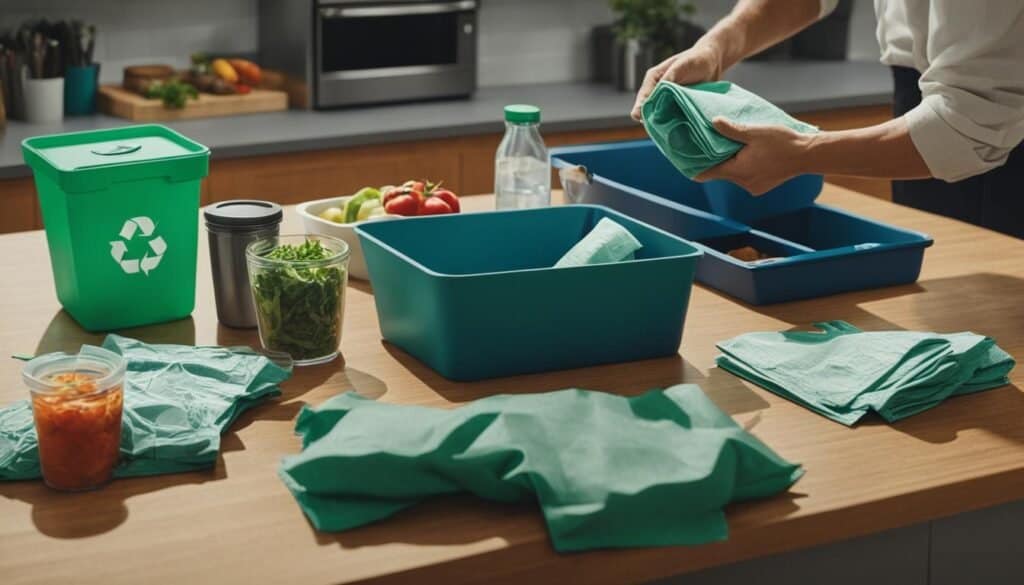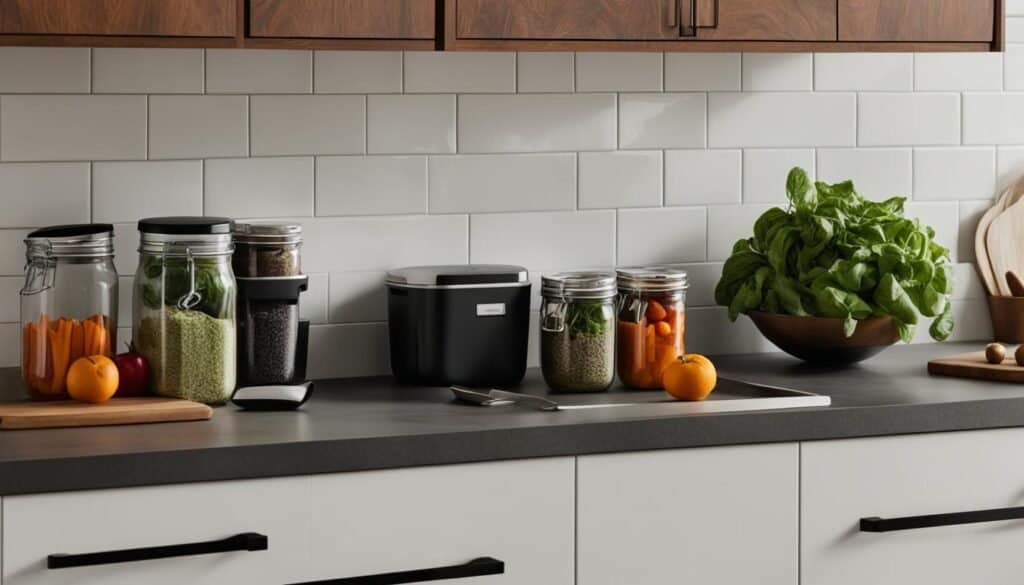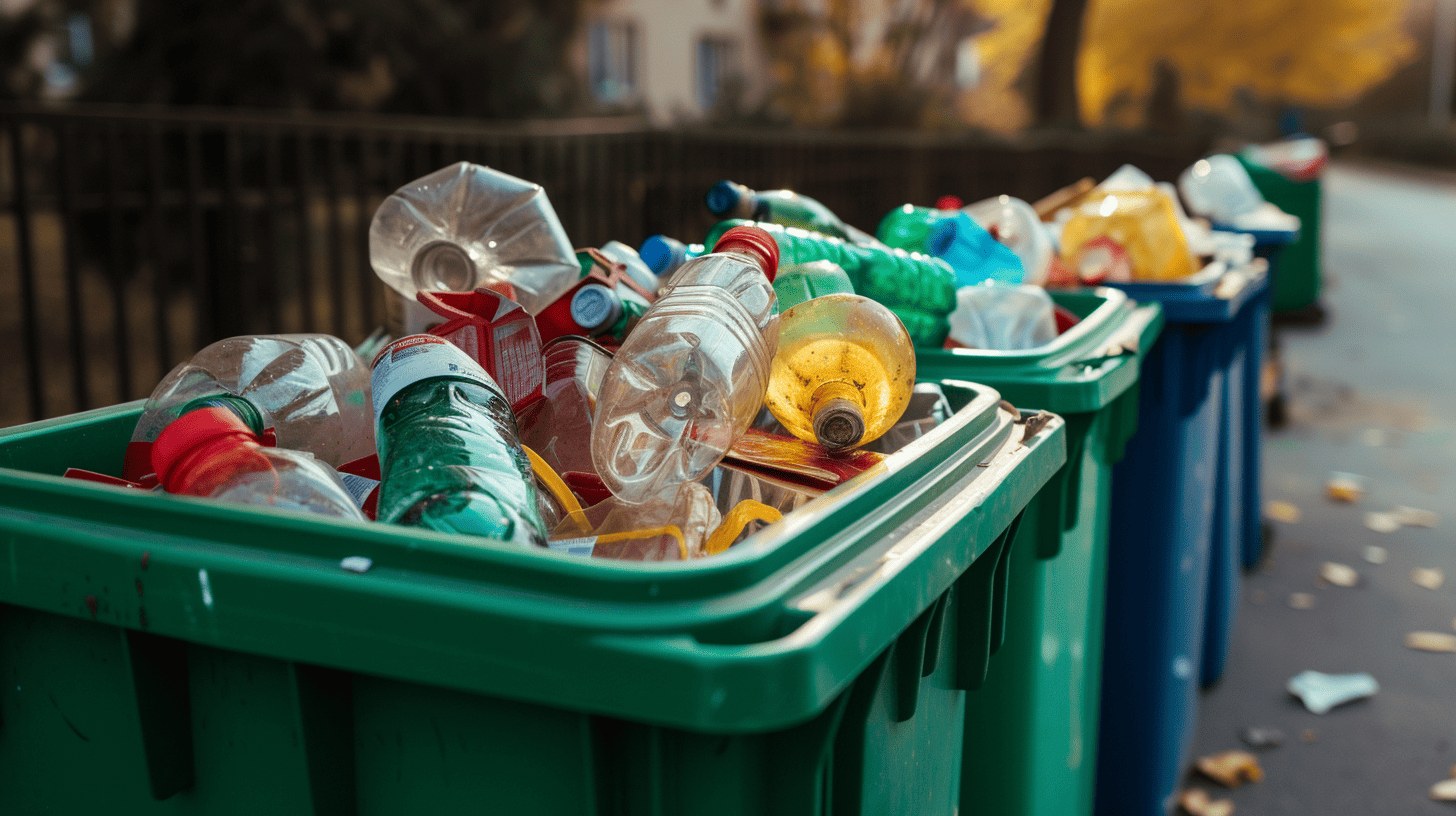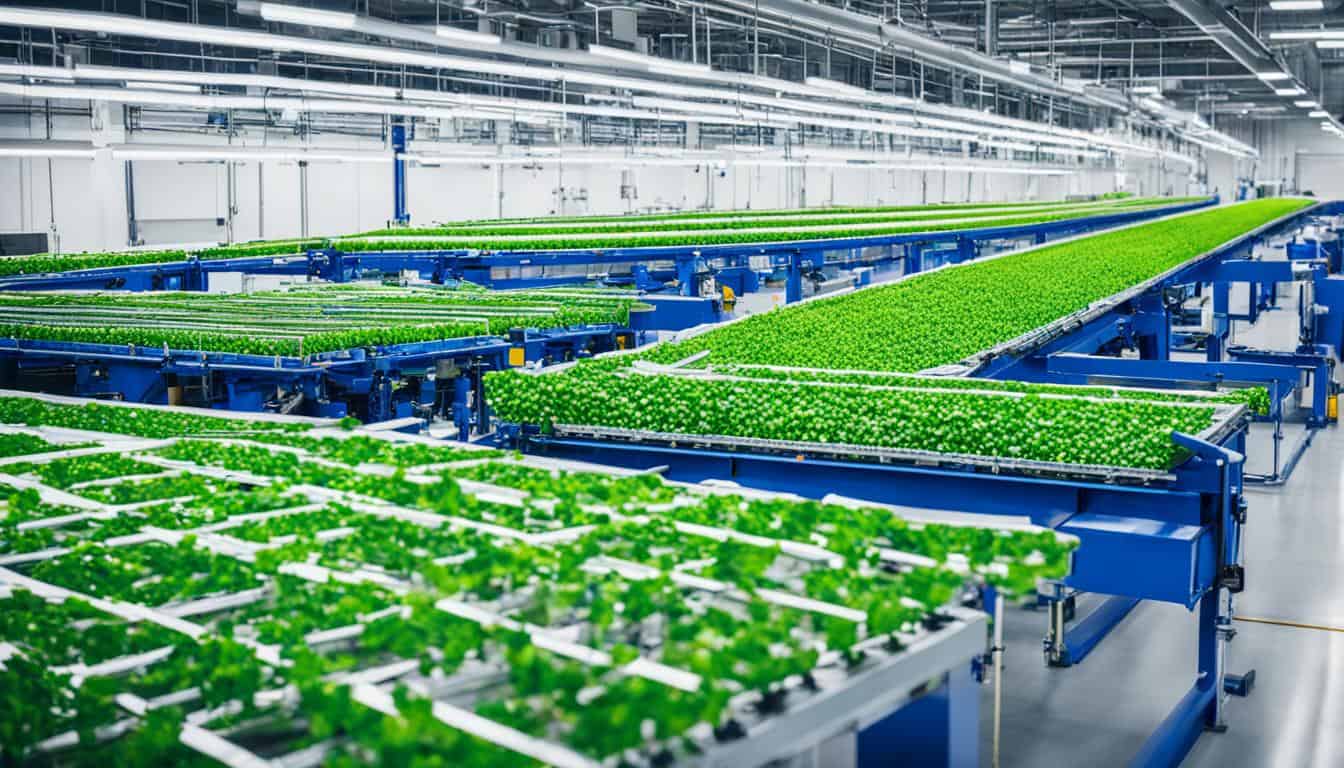Embarking on your zero waste journey may feel overwhelming at first, but don’t worry – I’m here to help you navigate the exciting world of sustainable living! In this guide, we’ll explore waste reduction and zero waste living, starting with simple steps you can take right away. We’ll cover tips on how to switch to reusable products, reduce your household waste, and make your daily routines more eco-friendly. So let’s begin our quest for a greener, more sustainable life together as we venture into the rewarding realm of zero waste living.
Key Takeaways
- Going zero waste is a journey that begins with small, actionable steps.
- Reducing waste involves both changes in consumption habits and adopting reusable alternatives.
- Zero waste living benefits the environment by reducing waste, conserving resources, and minimizing pollution.
- Personal care, household, and kitchen items all offer opportunities for sustainable swaps and waste reduction.
- Continuing education and engagement with the zero waste community can help you stay motivated and informed on your zero waste journey.
37 Tips to Reduce Waste
Here is a summary of 37 tips to reduce waste, with key information for each category:
Food Waste
- Do meal planning and use leftovers to reduce food spoilage
- Compost food scraps or use a compost drop-off service
- Buy in bulk using reusable containers to reduce packaging
- Choose local and in-season foods to reduce transportation emissions
Plastics
- Avoid single-use plastics like straws, bottles, and cutlery
- Bring reusable bags, bottles, and containers when shopping
- Choose products with less plastic packaging
- Opt for plastic-free personal care items like shampoo bars
Paper
- Print double-sided and use scrap paper for drafts
- Go paperless by storing documents digitally
- Cancel junk mail and switch to e-billing
- Use reusable cloth instead of paper towels
Clothing & Textiles
- Buy secondhand and vintage clothing to reduce waste
- Wash clothes in cold water and air dry when possible
Cleaning & Household Items
- Use reusable cloths and rags instead of paper towels
- Make DIY cleaners instead of buying products with plastic bottles
- Purchase reusable batteries instead of single-use
Transportation & Energy Use
- Drive less by walking, biking, or taking public transport
- Fly less frequently and offset flights when possible
- Perform an energy audit to increase home efficiency
Shopping & Gifts
- Support businesses with eco-friendly practices
- Buy used and recycled products when possible
- Give experiences and homemade gifts instead of new items
Bathroom
- Use reusable handkerchiefs instead of tissues
- Try reusable family cloths/rags instead of toilet paper
- Switch to shampoo bars instead of bottles
Kitchen
- Use matches instead of plastic disposable lighters
- Choose reusable metal straws over plastic ones
- Store leftovers in reusable glass containers
Garden
- Start composting yard waste instead of sending it to landfills
- Use battery-powered or manual lawn tools instead of gas-powered
Office
- Send documents digitally instead of printing copies
- Set printers to default to double-sided printing
- Eliminate personal waste bins to reduce trash
Events & Parties
- Use reusable decorations like banners instead of balloons
- Serve food and drinks using reusable plates, cups, and cutlery
- Send digital invitations instead of paper ones
Embracing the Zero Waste Lifestyle: A Primer
Learning how to go zero waste can seem daunting, but it can be approached with simple, manageable steps. There’s no single right way to achieve zero waste—it’s a journey of finding what works best for each person, weighing options as a conscious consumer, and starting with a few impactful practices.
Almost Zero Waste recommends reusing food scraps creatively, such as roasting apple or potato peels for snacks, or making a veggie broth with onion peels, carrot peels, and celery stems.
The overarching principle is to reduce consumption, making eco-friendly decisions such as refusing free promotional items that often end up as waste. With the option to buy products that serve multiple purposes, individuals can simplify their living space, eliminate unnecessary items, and embark on the path towards a zero waste home as part of a broader, zero waste community.
To help guide you along your beginner’s guide to zero waste journey, start by focusing on the following key areas:
- Eliminate single-use products
- Choose recyclable and compostable alternatives
- Prioritize eco-friendly materials and options
- Reduce overall consumption and waste generation
By implementing small but consistent changes in daily habits, you can contribute towards a more sustainable future and experience the benefits of a cleaner, greener living environment. Additionally, engaging with fellow zero waste enthusiasts and sharing experiences, tips, and challenges can inspire and motivate you to make even more positive changes.
Remember: The goal isn’t to be perfect—it’s about gradually adopting positive habits that lead to a more sustainable lifestyle.
Stay informed and adaptable as you continue your zero-waste journey. Keep seeking alternatives to the waste-producing items and practices in your day-to-day life, and educate yourself about the impacts of your consumption choices. Achieving a zero waste lifestyle is a long-term commitment that requires continuous learning, self-improvement, and a strong desire to create a healthier, cleaner planet for all.
Getting Started with Sustainable Waste Reduction for Beginners
The 5 R’s of Zero Waste Living form the foundation of a sustainable lifestyle, involving Refusing what you do not need, Reducing essentials, Reusing items, Recycling as the last option, and letting organic waste Rot through composting. These principles guide individuals on their zero waste journey, offering a framework for daily decision-making that prioritizes waste reduction and environmental preservation.
Understanding the 5 R’s of Zero Waste Living
The cornerstone of zero waste living lies in the 5 R’s: Refuse, Reduce, Reuse, Recycle, and Rot. By implementing these R’s, you can take a proactive approach to minimizing your environmental impact, reducing your waste, and embracing a truly sustainable lifestyle.
- Refuse: Say no to unnecessary items, especially single-use items and disposable products, to prevent waste from entering your life in the first place.
- Reduce: Cut down on the essentials and focus on consuming less, which results in fewer resources being used and less waste being produced.
- Reuse: Choose reusable alternatives over disposable options, giving items a second life and cutting down on waste.
- Recycle: When necessary, opt for items made from recyclable materials and follow proper recycling guidelines to minimize landfill waste.
- Rot: Compost your organic waste, contributing to a natural, circular process that replenishes the Earth and nourishes future growth.
Making the Most Impactful Changes First
Among the vast array of zero waste tips, a few have the potential to make a monumental difference promptly. Starting to compost can dramatically reduce the volume of waste headed for landfills, as can collecting hard-to-recycle items. Carrying a reusable water bottle and coffee cup can eliminate the daily accumulation of disposable drinks containers. Additionally, switching to reusables for grocery shopping and adopting zero waste personal care and beauty products can significantly decrease the amount of waste generated.
Simple Zero Waste Swaps for Daily Life
Transitioning to a zero waste lifestyle can be made simpler through one-time swaps. Replacing disposable cotton balls with fabric rounds, using sustainable dental floss, and opting for eco-friendly menstrual products like cups and cloth pads are examples of swapping out waste-creating items for reusable, cost-effective alternatives. Daily zero waste swaps include:
- Using handkerchiefs instead of tissues
- Bringing your own reusable utensils, straws, and containers
- Adopting biodegradable toothbrushes
These are small changes that foster sustainable living and waste reduction, making a noticeable impact on the environment and your daily life.
Everyday Actions to Minimize Waste Production

Minimizing waste production can be achieved through conscious daily actions. By integrating these practices into your lifestyle, you can significantly reduce your environmental impact and embody the principles of conservation and consume less. Some easy, effective ways to reduce waste in your everyday life include:
- Using your own shopping bags instead of plastic bags
- Refusing unnecessary straws and cutlery when dining out or grabbing takeout
- Opting for bulk purchases to reduce packaging waste
- Considering the lifecycle of products and choosing sustainable alternatives
- Turning off the water while brushing your teeth
- Investing in longer-lasting products
- Focusing on a reduce-before-recycle approach
Regularly evaluating your habits and making small adjustments can lead to major waste minimization and support your dedication to living an eco-friendly life. As you rethink your purchases and prioritize making sustainable choices, you create an entire system of lifestyle changes that contribute to lower waste production and a healthier environment.
“The greatest threat to our planet is the belief that someone else will save it.” – Robert Swan
Committing to these daily habits doesn’t only benefit the environment—it can save you money, simplify your life, and encourage personal growth. Participating in waste minimization practices is an empowering way to demonstrate your dedication to creating a greener future, one simple action at a time.
Personal Care and Household Items: Sustainable Alternatives
Adopting sustainable materials and plastic-free alternatives is essential for those striving for a zero waste lifestyle. Many everyday household and personal care items can be easily replaced with eco-friendly and reusable products, actively contributing to conservation efforts and green living. In this section, we look at effective ways to swap out daily essentials, make durable choices in menstrual items and personal hygiene, and reduce bathroom waste.
Choose wisely, tread lightly, and live sustainably.
From Plastic to Sustainable: Swapping Out Daily Essentials
Zero waste beauty products like shampoo bars, bar soaps, and metal safety razors help minimize plastic waste. Sustainable containers, beeswax wraps, and silicone sandwich bags offer eco-friendly alternatives to plastic packaging. By choosing reusable products and materials, individuals can embrace green living, reduce their environmental footprint, and support resource conservation.
Durable Choices in Menstrual Products and Personal Hygiene
Switching to sustainable menstrual products like menstrual cups or organic cotton tampons is a significant way to reduce disposable waste. Resourceful alternatives such as silicon ear swabs further lessen daily waste production while promoting environmentally-friendly options. Sustainable personal care products and practices help transform routines and habits into eco-conscious actions.
Reducing Bathroom Waste with Eco-Friendly Products
Creating a zero waste bathroom is achievable with biodegradable and compostable products such as bamboo toothbrushes, wood hairbrushes, and natural loofahs. Swapping out sponges for compostable scrubs and making homemade cleaning solutions are excellent ways to conserve resources and minimize landfill-bound waste. The power to go green is in our hands, and simple changes can make a world of difference.
Kitchen Practices That Support Zero Waste Goals

Implementing sustainable practices in the kitchen is an essential component of zero waste living. By making conscious choices and rethinking our daily habits, we can minimize our environmental impact while still enjoying delicious meals and maintaining a clean kitchen space. From using reusable kitchenware to embracing mindful meal planning, here are some ways to turn your cooking space into a more zero waste kitchen.
One key strategy for food waste prevention is thoughtful meal planning. By taking a little extra time each week to plan your meals and grocery shopping, you can reduce the amount of food “waste” and ensure a sustainable cooking experience. Some ideas include creating weekly menus, maintaining a well-organized pantry, experimenting with new recipes to use up leftovers, and freezing leftovers for future meals.
Another essential aspect of a zero waste kitchen is the minimization of kitchen waste through the use of reusable kitchenware. Ditch disposable cookware such as foil trays and paper plates in favor of sturdy alternatives like stainless steel baking sheets or ceramic baking dishes. Replace paper napkins with cloth versions that can be easily machine washed and reused.
Opt for food storage methods that don’t rely on disposable packaging. Mason jars, stainless-steel containers, and beeswax wraps are excellent choices for keeping food fresh without generating additional waste. Look for food storage solutions that are long-lasting, easy to clean, and versatile enough to adapt to various uses.
- Reusable silicone liners for baking sheets and pans
- Beeswax wraps instead of plastic wrap for covering bowls
- Reusable mesh produce bags for grocery shopping
- Stainless-steel or glass containers with airtight lids for storing leftovers
- Cloth napkins rather than paper napkins
Embracing a plant-rich diet also helps to minimize food waste and preserve natural resources. By choosing more plant-based options, you can support sustainable agriculture and reduce the environmental footprint of your meals. Get creative with your cooking by experimenting with various produce items and local, seasonal ingredients.
“The kitchen is a powerful place to make a positive environmental impact. By adopting zero waste practices, we can create a healthier planet, one meal at a time.”
In conclusion, turning your kitchen into a zero waste space is a truly attainable goal. By making small adjustments to your daily practices, you can actively engage in responsible waste management and contribute to a more sustainable future. Remember to take it one step at a time, and soon enough, your kitchen will become a vibrant example of zero waste living.
Conclusion on Sustainable Waste Reduction for Beginners
Embarking on a zero waste journey is about making small, sustainable changes that accumulate into a significant positive impact. As you progress along this path, it becomes crucial to refine daily habits, continue learning, and engage with the zero waste community for support and inspiration.
Next Steps in Your Zero Waste Journey
While perfection is not the goal, consistently applying the principles of zero waste living and remaining aware of the choices you make are key to building impactful and sustainable habits. Through these small but meaningful changes, you will contribute to creating a healthier planet, protecting the environment as well as embracing a lifestyle of simplicity, efficiency, and conservation.
Reflecting on the Benefits of Waste Reduction
Waste reduction offers sizable environmental benefits, such as reducing landfill waste, conserving natural resources, and decreasing pollution. By adopting zero waste practices, you will not only make a positive impact on the environment, but also experience personal satisfaction in knowing that your actions align with a regenerative and eco-friendly lifestyle.
Continuing Education: Resources for Sustainable Living
For those eager to deepen their knowledge and application of zero waste living, a wealth of resources exists to support ongoing education. From zero waste blogs and books to local community workshops and environmental protection agency guidelines, these tools will help you stay informed about best practices, new innovations, and ways to become more effectively involved in the zero waste movement. Engaging with these resources empowers you to make informed decisions and to continually evolve as a conscious consumer on the quest for a sustainable future.
FAQ on How to Go Zero Waste
Q: What is sustainable waste reduction and why is it important?
A: Sustainable waste reduction refers to the process of reducing, reusing, and recycling materials to minimize the amount of waste sent to landfills. It is important because it helps conserve natural resources, reduces pollution, and minimizes the impact on the environment.
Q: How can I reduce my waste at home?
A: There are many ways to reduce waste at home, such as using reusable water bottles and bags, buying in bulk to reduce packaging, composting food scraps, and choosing products with minimal packaging.
Q: What are some tips for reducing waste in everyday life?
A: Some tips for reducing waste in everyday life include choosing products with minimal packaging, donating or recycling items instead of throwing them away, and using reusable items like water bottles, utensils, and shopping bags.
Q: How can I start a zero waste lifestyle?
A: To start a zero waste lifestyle, you can begin by reducing single-use plastic, composting food scraps, buying in bulk, and choosing reusable items over disposable ones.
Q: What are some common items that can be reused or repurposed?
A: Common items that can be reused or repurposed include glass jars, old clothing, containers, and furniture, among others.
Q: What are the benefits of recycling?
A: Recycling helps conserve natural resources, reduces the amount of waste sent to landfills, saves energy, and decreases pollution. It also contributes to the creation of new products from recycled materials.
Q: How can I reduce waste in my workplace?
A: You can reduce waste in the workplace by using both sides of paper, setting up recycling bins for paper and plastic, encouraging digital communication to reduce paper waste, and using reusable items for meals and snacks.
Q: What are some practical waste reduction tips for beginners?
A: Practical waste reduction tips for beginners include carrying a reusable water bottle and coffee cup, using cloth napkins and reusable utensils, avoiding single-use items, and being mindful of the products you purchase.
Q: How can I dispose of hazardous waste safely?
A: Hazardous waste should be disposed of at designated drop-off locations or collection events. Contact your local waste management or environmental protection agency for information on how to properly dispose of hazardous waste.
Q: Can I save money by reducing my waste?
A: Yes, reducing waste can help you save money in the long run. By choosing reusable items over disposable ones, buying in bulk, and being mindful of your purchases, you can minimize unnecessary spending on single-use products.





Leave a Reply